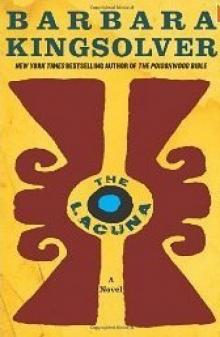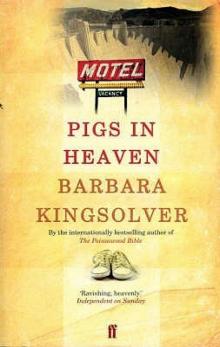- Home
- Barbara Kingsolver
Flight Behavior Page 28
Flight Behavior Read online
Page 28
"Let me see." She slid the book over, hoping he hadn't come across something that would warp him for life. The drawing baffled her: the man in the picture was holding a lamb by its hindquarters, apparently swinging it through the air. She studied the caption. "Resuscitation," she said. "He's bringing it back to life."
Preston looked at her with frank disbelief, and she corrected herself. "I didn't say that right--if something's dead, you can't bring it back. But if a lamb is not breathing when it's born, this is how you can help get it going."
"By throwing it?" he asked incredulously.
She scanned the writing on the page. "He's not throwing it, he's swinging it around in a circle. If the lamb is born with its nose and throat plugged with mucus, this is what you're supposed to do. 'Grasp it firmly by the hind legs and swing it,' is what the book says. The centrifugal force will clear out the nose and lungs."
The text also advised, "Make certain there are no obstructions in your path," but that brought to mind a violent, cartoonlike outcome, so she didn't read that part aloud. She was mindful of how the kids took their cues from her on what to take seriously, even at hectic times like this, the eye of their morning tornado.
Preston asked quietly, "Will we have to do that?"
"Oh, sweetie. No." She eyed the plaid bear that still dangled from Cordie's high-chair tray. How tempted she was to snatch it up by its heels and give it a practice whirl around the kitchen, lightening this mood, giving her children the easy gift of a belly laugh, but the better part of her nature resisted. A life was a life. She'd been orphaned at an age to internalize death as poor material for a joke. And likewise, salvation.
The cold was stupefying. She pulled on her heavy wool cap and mittens as she hoofed it up the hill, wishing for a scarf to pull across her nose. The frigid air prickled inside her nostrils and her eyes felt sticky, as if her tears were freezing up. She'd stuffed four clean pillowcases into a big shoulder bag along with her lunch and other necessities. On the outside chance she'd misunderstood Pete's instructions, those linens could spend a quiet morning hiding out in her purse. She wished she'd taken the time to put on more clothes. She had not checked the temperature at Ovid's camper, did not know when or if she'd bring herself to try that again, but this had to be mid-twenties, if not lower. Or maybe she'd forgotten how to judge the cold, in the course of these mild, dreary months.
At the top of the pasture she was surprised to see a drift of white on the dark tree branches and the shady floor of the woods. Snow had fallen in the night. The sky had cleared and the early light had melted any trace of it from the fields below, if it had stuck there. But up here on the mountain it was winter. The idea of snow on the butterfly trees pulled her toward panic. Snow falling on the butterflies themselves, their brittle wings and tender bodies, was a heartbreak she had failed as yet to imagine. She hit the trail at a hard lope and would have run, if she were a thousand packs of cigarettes younger. Briefly she considered going back to get the ATV, but knew there was no real need. Her presence at this disaster could not alter it, the damage was done.
Snow softened the forest's darkness, dusting evergreen limbs with light and reflecting the bright sky. Where the trail to the study site branched off from the gravel road, she noted that even this smaller path had become well marked by use. Signs of the visitors and their leavings were everywhere, blackened rocks pulled together for campfires, twinkling bits of broken glass rising through the thin floor of snow. She slowed her pace, to keep breathing, and tried to be observant. Clumps of snow-covered leaves high in the branches caught her eye, squirrel nests, but no living butterflies.
She descended the very steep side trail that led directly into the valley of the roost site, passing near what looked like an encampment fifty feet or so from the trail. Dellarobia had never camped out in her life--the appeal of sleeping in a nylon shroud was beyond her--but plenty of people felt otherwise, obviously, and some of them were living up here. The presence of strangers was no longer especially strange, but she felt an awkward shyness peering into the intimacy of these people's morning lives, hearing the muffled sounds of their zippers and voices. She could smell their coffee. There were six or seven, young men she assumed, but who could say really, hunkered close to their campfire. Wild-haired, like Cordelia on an average day. One of them stood up, trailing a tail of yarn and holding long, crossed needles, and Dellarobia registered that, impossibly, they were knitting. The standing one waved a bandaged-looking paw, slowly and widely as if signaling across some great divide. He, she, or it was dressed in a man's old coat over a cotton dress over jeans tucked into unlaced boots, exactly the kind of outfit Cordie would put together. Dellarobia hesitated before waving back, and then pressed on.
The fir forest when she reached it had its own air as always, dark and still. Within its snow-flocked boughs she began to pick out snow-laced colonnades of butterflies, first a few, then more, as her eyes adjusted to their wintry aspect. She stopped to pull off her mittens briefly and kneel down to touch the brittle skeins of veined wings heaped in the path at her feet, many more casualties than she'd ever seen before. Insect bodies lay in heaps directly under the colonies, pitifully wasted it seemed, like mounds of withered tomatoes fallen from the vines in a failed harvest. She stood up with both hands drawn to her chest and looked at the trees, trying to assess what remained. The forest still looked filled with the immense dark fingers of these clusters, lit from above, laced with orange at their edges where the sun reached through. If their numbers were diminished, she couldn't guess how badly, as their numbers had seemed infinite to her all along. The simplest conclusion was that they survived. Part of the world was still in place.
The little glade at the valley's bottom was becoming familiar to her, like a room in a house, the study site. She paused among the trees at its edge to let her heart stop pounding. Day by day she was getting her lungs back, since she'd quit smoking. Since stepping into the flammable atmosphere of Ovid Byron. He was there, on the opposite side of the glen. He and Pete stood together looking into the treetops, with their backs to her. She was surprised to see four field helpers already here too, moving solemnly around the clearing. Vern Zakas was one of them, breaking sticks across his knee to feed a small campfire. She'd recruited these kids, whom Ovid put straight to work. Last week they'd made a low table from a sheet of plywood siding Cub scavenged for them, propping its four corners on big rocks, and the ground around the table already looked trampled. This morning the field balance was set up there, flanked by half-open equipment packs spilling their contents. Waxy rectangles of glassine envelopes splayed across the table like cards after an abandoned poker game. She wondered if men could even see the messes they made, or if they had differently structured eyes, as Ovid had told her cats and dogs and insects did. She should get over there and organize things. The boys seemed subdued, their ordinary conviviality suspended, presumably for the urgency of this day. She felt oddly territorial. They'd gotten here before she did.
She saw Pete's back arch peculiarly, and it took her a second to interpret the odd posture. He was drawing back an arrow across a bow. It flew almost straight up into the treetops, then fell back at its stilted angle, bouncing and coming to rest in the limbs fifteen feet above their heads. Dellarobia knew there was a bow-hunting season for deer but could think of no tree-dwelling creature they might want to shoot. She watched for a long while, disinclined to show herself. Vern and the others watched too, she noticed, each time Pete let an arrow fly. He was retrieving it by means of some sort of filament she couldn't see. Fishing line, maybe. Every pass of the arrow through branches disturbed the roosting colony, sometimes causing small clumps of butterflies to drop to the ground, but this was evidently not the goal. She gathered he was trying to pass a line over the top of a tall fir tree. On the fifth try she witnessed, the arrow cleared and a whooping cheer rang out as if he'd made a touchdown. Boys.
She took the opportunity of their distraction to enter the group without direct saluta
tion from the boss. Her anxiety since Saturday had condensed around the moment when she would meet his eyes and learn in a flash if he knew he'd been seen, yes or no. Nakedness again, of a kind. Avoiding that moment now felt crucial. She walked directly to Vern, who had begun trying to unloop the long nylon tape measure and was openly relieved to see her. Dr. Byron wanted them to census the butterflies on the ground, he told her, and they were clueless. She could well imagine how that had gone, Ovid confidently pummeling them with a flurry of unretainable instructions and walking off. Luckily she knew this one--it was the first task she'd done up here, with Bonnie and Mako. She aimed Vern north to walk the length of the site, stretching the tape as he went, and laid out one-meter squares along the transect. Pete came over to greet her.
"Did you remember the pillowcases?" His face suggested doubt, so she was thrilled to unzip her shoulder bag and draw them out one at a time like a magician's scarves. The number, four, seemed to please him too. Pete directed the helpers to scoop all the butterflies from four of their square-meter quadrats into pillowcases after they'd counted them. "Dead or alive," he told Vern. "One quadrat per pillowcase, doesn't matter which ones you choose, and we'll take them back to the lab."
The boys went to work on their assigned plots, accepting the strange assignment without question. She recalled her own first days spent here with a tight lid on her normal curiosity, afraid of betraying her expansive ignorance. These kids were even more earnest than she'd been, judging by the way they pressed their knees into the soggy black leaf mold, all of them mindless of their jeans, which would never recover. Except Roger, who wore shorts in all weathers. Roger and Carlos were two of the three Californians who'd introduced themselves to Dellarobia when they arrived. They'd camped up here ever since, increasingly unkempt but uncomplaining. The third one had gone home. Pete called them "the Three-Fifty guys" instead of using their names, and she wondered if that was meant to be disparaging. She and Pete seemed allied, now that other people had come onto his turf, and it fascinated her, the rules of the club. She was a little seduced by the chance to be an insider, and invented the code name Sideburn Vern for Pete's amusement. But she felt bad about it after Vern turned out to be such an eager worker. And she really liked the California boys, who were unfailingly sweet and respectful, unlike a lot of the tourists who tramped through here, demanding water and directions from Dellarobia as if she were a hired hand. If they conversed with her at all, their syllables would sometimes broaden as if she might need help with English.
She ran to catch up with Pete. "What's the deal with the bow and arrow?" she asked him. "I could report you for shooting butterflies out of season."
He smiled. "We're stringing up the eye-buttons."
"Eyes?"
"I, the letter. Little i, big B." He opened an equipment pack and extracted a ziplock full of dime-size silver discs, like watch batteries but thicker. iButtons were tiny computerized devices that recorded temperatures over the course of time. A Velcro attachment was used to anchor each button inside a short length of PVC pipe to shelter it from rain and sun, and these would get fastened to the fishing line he'd shot over the tree. They would run them up the flagpole, so to speak, at intervals of every five meters from earth to treetops. "They save data in real time," he explained, "like the black box in your car engine." He also told her, though she didn't ask, the buttons cost ten dollars each.
If her station wagon had a black box, it was news to Dellarobia, but she got the gist and went to work alongside Pete, proving adept at rigging up the housings and attaching them to the filament that would hoist them. She remembered the resume she'd given Dovey prior to landing this job: experienced at mashing peas and arbitrating tantrums. She could now add: owns pillowcases, good at Velcro. They would leave the iButtons up the tree for forty-eight hours and then bring them back to the lab. "Weren't you here when we did this the first time, back before Christmas?" Pete asked.
"No. I only came up with you guys just the once. We did body counts."
"That's right," Pete said, contorting his mouth sideways as he tightened a knot with his straight, white teeth. Braces, she thought. Someone paid good money for those, he ought not to use them as pliers. "The temperature varies, all the way up," he told her. "Especially in these evergreen forests. You'd be surprised. There's a ton of temperature data recorded on the Mexican overwintering sites by Brower et al. We want to see how the thermal characteristics of the Feathertown site compare to normal roosting sites."
She pictured these words, the Feathertown Site, appearing someday in a science book. Not the Cleary Site, or the Turnbow Site. She wondered if she was disappointed not to have her own name memorialized. That's what it would be, a memorial, the place where a species met its demise. It was crazy, all this hard work, to that end.
"So we bring the buttons back to the lab, and then what?"
"There's a reading device that plugs into the computer. It takes a while to download all the data and then plot it," he warned. "Get ready for a tedious day."
"As opposed to this one," she said, pausing to breathe on her frozen fingers.
"As opposed to this one."
She found she could not make herself say Ovid's name. "Is he worried?" she asked finally. "Is this really terrible for the butterflies?"
"It could be worse." Pete seemed to be making a point of showing no emotion. "It was definitely low twenties last night, so the microclimate of these firs is protecting them up to a point. Like they do in Mexico. I guess he wants a temperature profile of the roost through this cold stretch to see what they can actually survive."
"Where did he go?" she asked.
"He had the camera. I think he's doing a photo census."
She remembered a detail Pete had forgotten: to record the serial number of each button before sending it up the tree. He did seem a bit rattled, so maybe things were worse than he was willing to say. She asked about the plan for the pillowcases.
"Oh, right," Pete said. "Those can't lie around up here all day, somebody needs to take them down to the lab this afternoon. What you do," he said, giving her to know who somebody would be, "is you shake the butterflies to the bottom and pin the pillowcases up on a clothesline or something. Open-side up. You can rig up a line in the lab. And then you just watch them."
"You watch pillowcases full of dead butterflies?"
"They're not all dead. There's a bunch of sleepers in there, you'll see. When they warm up they start crawling up the inside of the pillowcase. At the end of the day you count the living and the dead, and do the math. You get a proportion. Multiply that figure times all the bodies we counted on the ground, and that's your mortality estimate."
She thought this through, stepwise. "Could I hang them up in my house?"
"Sure. It's probably warmer than the lab," he said, which was true, but she was thinking of Preston when he came home from school. He would sit on the edge of a chair and watch those pillowcases for all he was worth. He'd race to tell her each time another sleeper struggled from its stupor to begin the slow climb, pressed between soft walls of fabric. She and Preston would cheer for the stragglers, because at the end of the day, it was something they could do. Count the living and the dead, and do the math.
Dellarobia forgot about eating her lunch until well past noon. Pete had left her rigging up more lines for buttons while he shot more arrows. Sometimes he crouched on his heels at the plywood table and entered sequences of mystery data into Ovid's small computer. Ovid himself remained at large. The sun gained its legs in the forest throughout the morning, warming the air by imperceptible degrees until she realized her fingers had thawed and she no longer needed some of her outer layers. Around the time she shed her coat the temperature touched some threshold that set off an extravagant spectacle of butterflies twitching open and even launching. The air got crowded with little celebratory bursts of action, like rice at a wedding. She stopped tying fishing line through bracelets of pipe and lifted her gaze. Pete looked up from his keyboard,
the boys stopped counting bodies and rose unsteadily from the ground like soggy-kneed zombies. As a congregation they lifted their eyes in thanks. There was no whooping or backslapping, as when Pete's arrow bested the tree. The difference was understood.
She felt lightheaded, then, and remembered hunger in its full measure. She grabbed her shoulder bag and headed for the big mossy log that was still the study site's best furniture. Carlos and Roger were there, black knees and all, their coats flung on the ground, shirtsleeves rolled to the elbows, standing on the log bridge with their crossed arms in front of their chests, playing some game of trying to bump one another off. Carlos was the taller, with gingery hair, despite the Mexican-sounding name. Roger's two-week beard and perpetual baggy shorts made her think of Snow White's dwarves.
"Hey, Dellarobia," they both called as she approached. They seemed to relish pronouncing her name, in a manner she'd seldom experienced. Maybe in California people took the unconventional in stride. Automatically she assessed the distance the boys could fall, maybe a sprained ankle's worth, and the cellophane skins of their former lunches spread over the log. A mother, regardless of job title. She resisted the urge to clean up and seated herself a safe distance from their roughhousing. The peanut butter sandwich in her purse had burrowed to the bottom, and she had to unload a pile of things to unearth it, setting them beside her on the log: four disposable diapers, socks, a box of Bug's Life Band-Aids, and an ice-cube tray for which she had no good explanation.
Ovid Byron materialized and took a seat on the other side of her little pile. Her face flooded scarlet as she hastily squirreled away the weird collection and unwrapped her sandwich. "Morning," he said cheerfully, heedless of the exact time, or her trauma. He seemed to have no special feeling about seeing her. "How are you holding up?"
"Fine." The answer, then, was no, he wasn't aware. Heaven help her. She could stay on this log and in this world. She studied her PBJ, the strata of brown and florid purple between white cushions of bread. Or maybe he knew, and didn't mind. Was that possible? He must have seen that image of her on the Internet, essentially naked, and had certainly never mentioned it. Cautiously she glanced at his sandwich, something bulbous and store-wrapped, probably picked up by Pete in town. Ovid's enthusiasm suggested it was the first food he'd seen on a long, cold day. He had been up here since dawn.

 Prodigal Summer: A Novel
Prodigal Summer: A Novel Animal Dreams: A Novel
Animal Dreams: A Novel The Poisonwood Bible
The Poisonwood Bible High Tide in Tucson
High Tide in Tucson The Lacuna
The Lacuna The Bean Trees
The Bean Trees Animal, Vegetable, Miracle: A Year of Food Life
Animal, Vegetable, Miracle: A Year of Food Life Pigs in Heaven
Pigs in Heaven Small Wonder
Small Wonder Flight Behavior
Flight Behavior Homeland and Other Stories
Homeland and Other Stories How to Fly (In Ten Thousand Easy Lessons)
How to Fly (In Ten Thousand Easy Lessons) Unsheltered
Unsheltered Animal Dreams
Animal Dreams Prodigal Summer
Prodigal Summer Animal, Vegetable, Miracle
Animal, Vegetable, Miracle